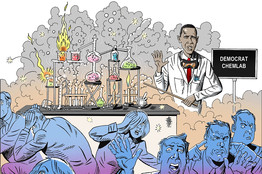The Obama Heyday Is Over
With so many Democrats running against the president's agenda in the midterm, change will come in the next Congress, regardless of which party is in control.
By Kimberley A. Strassel
WSJ.com
Barack Obama hit the campaign trail this week to resurrect some of that hopey-changey stuff and to complain that his critics talk about him "like a dog." Turns out the president wasn't, in fact, referring to his own party.
Voters might be forgiven the confusion. It isn't as if Democrats have been showing Mr. Obama much love. Quite the opposite. Seven weeks from Election Day, the vulnerable wing of the majority has finally found itself a campaign issue: blunt opposition to Mr. Obama and his agenda.
Has it only been 20 months? Candidate Obama swelled into office with an ambitiously liberal plan. He promised his party that his legislative items would be more than policy triumphs; they'd be political triumphs. Stick with me, he said, and we'll get credit for leadership. Voters will come to love this stuff. Polls will improve. I'll campaign in your district.
It was bunk, as many Democrats knew even back then. Witness the threats and bribes necessary to coax a bare majority for every vote. But enough went along. And now that the ambitious Obama experiment in liberal governance is going kaboom, his members—even those who voted with him—are running for cover.
Health care? A total of 279 House and Senate Democrats voted for ObamaCare. Not one is running an ad touting that vote. How can they, given headlines about Medicare cuts and premium hikes? You will, however, find a growing catalogue of ads such as this one from Maryland Rep. Frank Kratovil: "As a career prosecutor, I made decisions on facts, not politics," and that's why "I voted against . . . the health-care bill."
Not to be outdone, Alabama Rep. Bobby Bright's ad explains he voted against "massive government health care." South Dakota's Stephanie Herseth Sandlin boasts she voted against the "trillion-dollar health-care plan." But the prize goes to former Georgia Gov. Roy Barnes, vying to get his old job back: Not only is ObamaCare "financially devastating," it is "the greatest failure, modern failure, of political leadership in my lifetime."
Stimulus? Only a handful of Democrats can be found who will even utter the dreaded "s" word—and those are the ones bragging they voted against it. The rest have developed a curious code involving brief references to "roads" and "bridges." Even the White House is running from the White House. Press Secretary Robert Gibbs crankily lectured the press corps this week that the latest $50 billion Mr. Obama wants to "spur" the economy is absolutely not a "stimulus."
Cap and trade? "I voted against Nancy Pelosi's energy tax on Hoosier families," explains Indiana Rep. Joe Donnelly in an ad, echoed by North Carolina Rep. Mike McIntyre and Pennsylvania Rep. Jason Altmire. And the yes votes are rushing to argue that all they were really voting for was "renewable energy."
Financial regulation? What's that? Most of the country doesn't know, and few Democrats are bothering to explain. They see more mileage in ads putting distance between themselves and the auto bailouts, the president's budget, or the party's cultural reputation. Roy Herron, running in Tennessee, ran an ad describing himself as a "truck-driving, shotgun-shooting, Bible-reading, crime-fighting, family loving country boy." This is not a joke.
As for campaigning, Mr. Obama failed to warn Democrats that—thanks to the agenda he was asking them to pass—by September he'd be upside-down in his approval on most issues, and not much help. Instead of a president to help them, Democrats have found a president to run against. And it isn't George W. Bush.
The White House is now letting it be known that it is miffed that more Democrats aren't running to embrace its new "economic" plan. But as parents are fond of telling their five-year-olds, choices have consequences. This White House could have pivoted to the economy at any point—as many Democrats were begging it to do—but instead doggedly pushed ahead with an unpopular agenda. Many Democrats are no longer listening.
Will the anti-Obama strategy work? In this environment, running away from Mr. Obama certainly beats running to him. Then again, midterms are referendums on a president's agenda, and the country is in a mood to punish Democrats en masse. For those anti-Obama Democrats who do survive, the political lesson will be that there is mileage in telling Mr. Obama no.
This is where today's exodus will really be felt—after the election. The president still has a to-do list. Yet the more this election becomes about the toxicity of his "accomplishments," the less ability Mr. Obama has to command a caucus. Republicans will be hunting for votes to block and reverse, and some liberated Democrats may feel happy to help.
Bill Clinton dealt with the 1994 massacre by moving right and triangulating. It is unclear whether the ideological Mr. Obama has the ability to follow suit. What is clear is that some big changes are now necessary. The Obama heyday is officially over.
Write to kim@wsj.com
